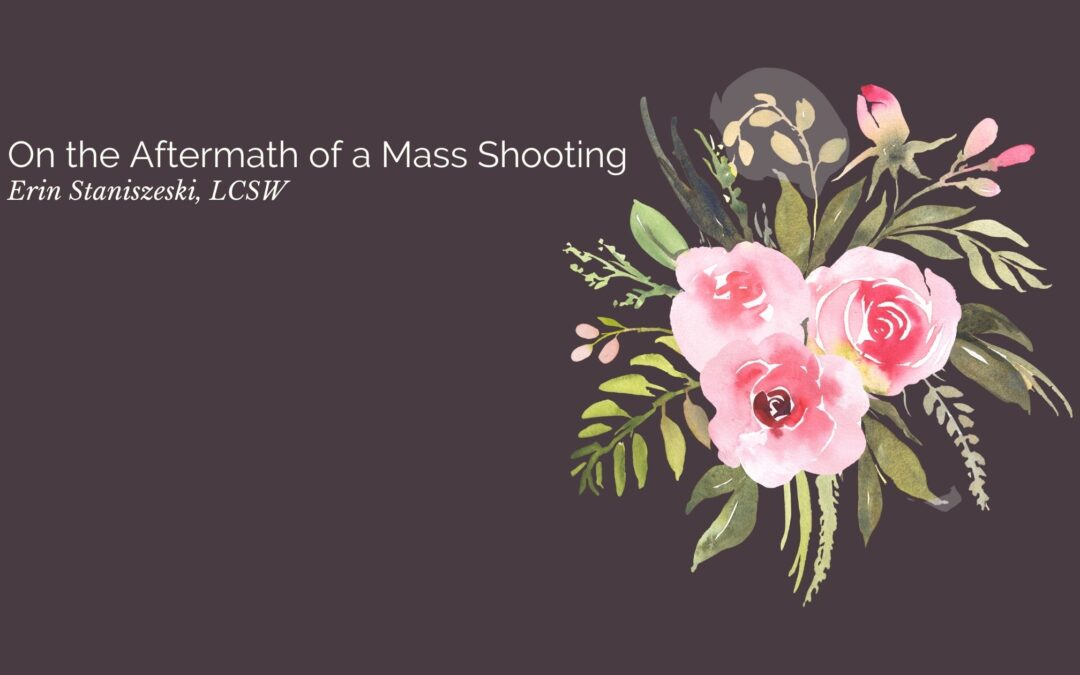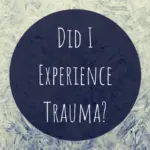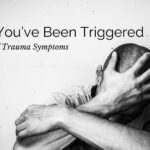
Over the past 8 years, I have had the immense privilege of working with survivors of mass shootings and witnessing their strength and resilience as they heal from such a horrific experience. My goal in writing today is to provide guidance to those in the community who want to help and to normalize some of the things survivors may be experiencing right now.
For a Survivor
- Honor your feelings, they are all valid. It is okay if you are crying one minute and enraged the next. It is common to feel numb, angry, grief, overwhelm, and unsafe. Other common symptoms may include not being able to make a simple decision, depression, anxiety, panic, hyper vigilance. Feeling foggy, interrupted sleep, survivors guilt and even physical symptoms are not uncommon.
You may feel triggered by sirens or finding yourself looking for exits. You may have reminders of the shooting that you do not expect. For example, one day you might suddenly feel panicked when eating a certain food – and then you remember you were shopping for this exact item when the shooting started. While these things may be unpleasant, they are a normal response to an extremely traumatic event. They are a body response. It is your central nervous system taking over to respond to a perceived threat. It is not just something in your head and not something you have conscious control over. AND, there are things that you can do to help calm your central nervous system.
- On that note, it is possible to heal. You must get to a functional relationship with the trauma. It is never going away and you have to be able to coexist with it. Healing is a process and it takes time but trauma recovery is possible.
- This may seem like trivial, obvious advice but drink water, eat healthy. Do the little things that can help in the moment. Those things are important and often neglected. Try to follow a routine.
- Avoid alcohol and other substances. It may be tempting to dissociate or numb the feelings but it will not help in the long term.
- Avoid the news or only watch or read it in small doses.
- Try not to isolate. If you cannot go to the store, that is okay but find a way to get out in a way that makes you feel safe. Go for a hike with a friend or something instead.
- Pair down your to-do list. Give yourself a break. Do not hold yourself to the same standard you normally do. It is okay to get to good enough.
- Talk about your experience. It can be a trusted friend or family member. Find a therapist or peer support (see resources below). This doesn’t need to happen right away, you may not be able to process it for some time but if you are feeling like you need support, you are not alone. Especially if you are experiencing flashbacks or feeling like you are there, seek out help.
How to Support a Friend or Relative who has Survived a Mass Shooting
As this is a community event, it can be tempting to say, “I was supposed to go to that movie…or I always shop at that King Soopers” or something similar. It may sound and feel like empathy, but it often does not feel like that to the survivor. You did not witness it. You cannot understand what the survivor is experiencing. Refrain from trying to empathize in this way. Instead just listen if they want to talk. Your job is not to fix it. It is to be there and say, “I am so sorry you experienced this, how can I help?
- Check in with them. Make sure that they are meeting basic needs. They may be in shock. They may not be ready to talk about their experience yet. It is often not until much later that they may be able to start processing the experience. Be patient.
- Just after a shooting, there tends to be a lot of community support and then, after a few months, the “hype” dies down. The media is gone and everyone else continues living their lives. When this happens, survivors often feel isolated and may even feel like the world has forgotten them. Continue supporting them long after. This will never not have happened to them.
They say time heals all wounds, but that presumes the source of the grief is finite ~ Cassandra Clare
Resources
- The Rebels Project was started by survivors of Columbine High School after the Aurora shooting because they wanted to find a way to provide the support they wished they had had. It is run by survivors, for survivors and they provide peer support, connection, resources and funding for services for survivors. Learn more about them here and if you are wanting to donate or sponsor a survivors cost of therapy.
- If you are in crisis: Call the crisis hotline, 1.800.493.8255, Text “TALK” to 38255, or go to the nearest emergency room.
- Experiencing PTSD: Resources for Survivors and the Public Following Disaster and Mass Violence – PTSD: National Center for PTSD (va.gov)
- Want to read more about coping with trauma: Emotional and Psychological Trauma – HelpGuide.org
- Manage traumatic stress: 7 Tools for Managing Traumatic Stress | NAMI: National Alliance on Mental Illness
- Learn about fight, flight, freeze response: What is Fight, Flight, Freeze? A Brief Definition of the Stress Response System with Mindfulness Exercises to Help You Relax – Catalyst Center (catalystcenterllc.com)
- What does it mean to be triggered: Signs You’ve Been Triggered: Examples of Trauma Symptoms (catalystcenterllc.com)
Photo Credits:
Photo by Muhammed Kara on Unsplash
Photo by Claudia Wolff on Unsplash
Photo by Priscilla Du Preez on Unsplash


 You may feel triggered by sirens or finding yourself looking for exits. You may have reminders of the shooting that you do not expect. For example, one day you might suddenly feel panicked when eating a certain food – and then you remember you were shopping for this exact item when the shooting started. While these things may be unpleasant, they are a normal response to an extremely traumatic event. They are a body response. It is your central nervous system taking over to respond to a perceived threat. It is not just something in your head and not something you have conscious control over. AND, there are things that you can do to help calm your central nervous system.
You may feel triggered by sirens or finding yourself looking for exits. You may have reminders of the shooting that you do not expect. For example, one day you might suddenly feel panicked when eating a certain food – and then you remember you were shopping for this exact item when the shooting started. While these things may be unpleasant, they are a normal response to an extremely traumatic event. They are a body response. It is your central nervous system taking over to respond to a perceived threat. It is not just something in your head and not something you have conscious control over. AND, there are things that you can do to help calm your central nervous system. As this is a community event, it can be tempting to say, “I was supposed to go to that movie…or I always shop at that King Soopers” or something similar. It may sound and feel like empathy, but it often does not feel like that to the survivor. You did not witness it. You cannot understand what the survivor is experiencing. Refrain from trying to empathize in this way. Instead just listen if they want to talk. Your job is not to fix it. It is to be there and say, “I am so sorry you experienced this, how can I help?
As this is a community event, it can be tempting to say, “I was supposed to go to that movie…or I always shop at that King Soopers” or something similar. It may sound and feel like empathy, but it often does not feel like that to the survivor. You did not witness it. You cannot understand what the survivor is experiencing. Refrain from trying to empathize in this way. Instead just listen if they want to talk. Your job is not to fix it. It is to be there and say, “I am so sorry you experienced this, how can I help?

